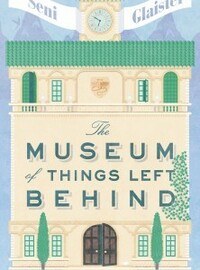Take a photo of a barcode or cover
lighthearted
slow-paced
a very reluctant 3⭐ tbh
this book was one of my 2020 quarantimes purchases. i must admit it was the title which attracted me—the concept was one that i thought would be utterly compelling—so let's just get one thing out of the way: the Museum of Things Left Behind does actually exist in the narrative, but it plays such a minor role (if it could even be considered one?) that it's hard not to feel cheated.
also, the story started off terribly slow—so slow i very nearly gave up reading it. i only ploughed through the first half bc i very rarely DNF a book. it did pick up somewhere around the 200-page mark, and thankfully most of the rest of the story was enjoyable. BUT the ending had me like ???? it didn't feel complete??
this book was one of my 2020 quarantimes purchases. i must admit it was the title which attracted me—the concept was one that i thought would be utterly compelling—so let's just get one thing out of the way: the Museum of Things Left Behind does actually exist in the narrative, but it plays such a minor role (if it could even be considered one?) that it's hard not to feel cheated.
also, the story started off terribly slow—so slow i very nearly gave up reading it. i only ploughed through the first half bc i very rarely DNF a book. it did pick up somewhere around the 200-page mark, and thankfully most of the rest of the story was enjoyable. BUT the ending had me like ???? it didn't feel complete??
Quirky, whimsical, endless bureaucracy, evil capitalism, a benevolent dictatorship, women's hidden power, a pair of protestors, sustainability, a broken clock, lifelong education, gentleness, the secret of time....all washed down with a magical cup of tea.
******copy via NetGalley in return for an honest review******
Quirky and different, but not really my cup of tea.
Quirky and different, but not really my cup of tea.
Boring and felt over-written. The title is what attracted me to the book, and unfortunately I find it misleading. I’m not going to bother finishing this.
lighthearted
medium-paced
Plot or Character Driven:
A mix
Strong character development:
No
Loveable characters:
Yes
Diverse cast of characters:
No
Flaws of characters a main focus:
No
I really enjoyed this book. It was built beautifully and did not let me down. It draw me into the world and though the ending was kind of abrupt, I guess it's just the fact that I've not had time to let it sink in properly. I'm growing more and more convinced that ramming stories into unnatural shapes because that's the literary convention and convenient for the reader is total bs. This one doesn't deviate too much from convention, but it made me aware of my expectations as a reader. It's fun to be challenged once in a while.
lighthearted
slow-paced
Strong character development:
No
Charming little story but predictable and no character development
A Comedy of Power
In the line of Gulliver’s Travels, Gormenghast, and The Mouse That Roared, The Museum of Things Left Behind is a send-up of cultural, political and corporate power. Its conceits, its isolation and insulation from reality, its arrogant self-justifications and its inveterate misogyny are displayed with wit and humour. At a personal level the book plays up the particularly masculine disease of the anxiety of influence - the simultaneous devotion to and resentment toward one’s forebears from whom power has been received. Sociologically Glaister shows insight from obvious first-hand experience about how organizations really work, which is generally not how they’re supposed to. They have a momentum of their own which isn’t really subject to anyone’s control.
Glaister’s protagonist, the “Elected Dictator” of the minuscule country of Vallerosa, is, in theory, politically omnipotent. In practice he is the most neurotically constrained person in the kingdom. He can trust none of his ministers; and since the Prime Directive of power is to stay in power, he feels continually oppressed. His father, he feels, had done more. As he says to his chief of staff, “You know, Angelo, I’ve felt for a while now that I’m losing control. I see no tangible signs of it but, from the periphery of my vision, I can tell that, little by little, the things I have within my power are becoming becoming more precarious.”
His vulnerability to his own staff is matched only by his gullibility when confronted with the jargon of American management consultants who know their real job is not to accomplish anything other than to keep him around - in order, of course, that they might stay around. But even their assurances leave him with doubts: “The numbers. Do they add up? If we’re not importing anything, and we’re going to sell everything we’ve got, and all we’ve got now is tea, what are our people actually going to live on?... And, anyway, why do we need more? Whom do we offend if we’re satisfied with enough?” In the battle of common sense vs. the economic imperative, it is always advantage growth. ‘Better’ is the comparative for... well no one is quite sure for what. Success is what passes for success.
The eponymous museum is a Lost & Found of the detritus of the world forgotten randomly over the years in Vallerosa, a sort of national unconscious. But of course each of the residents also carries around his own psychic baggage, which can only be revealed by appropriate external intervention - in this case the arrival of a special guest with royal credentials. Is not her letter of introduction stamped with the image of the British monarch? Thus it is usually through error that one becomes aware of the unconscious. Real progress is always a mistake; we don’t create it, we fall into it.
The Museum of Things Left Behind is witty, well-written, and instructive. It’s a book that all politicians, corporate executives, and economists ought to read. But of course they won’t.
In the line of Gulliver’s Travels, Gormenghast, and The Mouse That Roared, The Museum of Things Left Behind is a send-up of cultural, political and corporate power. Its conceits, its isolation and insulation from reality, its arrogant self-justifications and its inveterate misogyny are displayed with wit and humour. At a personal level the book plays up the particularly masculine disease of the anxiety of influence - the simultaneous devotion to and resentment toward one’s forebears from whom power has been received. Sociologically Glaister shows insight from obvious first-hand experience about how organizations really work, which is generally not how they’re supposed to. They have a momentum of their own which isn’t really subject to anyone’s control.
Glaister’s protagonist, the “Elected Dictator” of the minuscule country of Vallerosa, is, in theory, politically omnipotent. In practice he is the most neurotically constrained person in the kingdom. He can trust none of his ministers; and since the Prime Directive of power is to stay in power, he feels continually oppressed. His father, he feels, had done more. As he says to his chief of staff, “You know, Angelo, I’ve felt for a while now that I’m losing control. I see no tangible signs of it but, from the periphery of my vision, I can tell that, little by little, the things I have within my power are becoming becoming more precarious.”
His vulnerability to his own staff is matched only by his gullibility when confronted with the jargon of American management consultants who know their real job is not to accomplish anything other than to keep him around - in order, of course, that they might stay around. But even their assurances leave him with doubts: “The numbers. Do they add up? If we’re not importing anything, and we’re going to sell everything we’ve got, and all we’ve got now is tea, what are our people actually going to live on?... And, anyway, why do we need more? Whom do we offend if we’re satisfied with enough?” In the battle of common sense vs. the economic imperative, it is always advantage growth. ‘Better’ is the comparative for... well no one is quite sure for what. Success is what passes for success.
The eponymous museum is a Lost & Found of the detritus of the world forgotten randomly over the years in Vallerosa, a sort of national unconscious. But of course each of the residents also carries around his own psychic baggage, which can only be revealed by appropriate external intervention - in this case the arrival of a special guest with royal credentials. Is not her letter of introduction stamped with the image of the British monarch? Thus it is usually through error that one becomes aware of the unconscious. Real progress is always a mistake; we don’t create it, we fall into it.
The Museum of Things Left Behind is witty, well-written, and instructive. It’s a book that all politicians, corporate executives, and economists ought to read. But of course they won’t.






